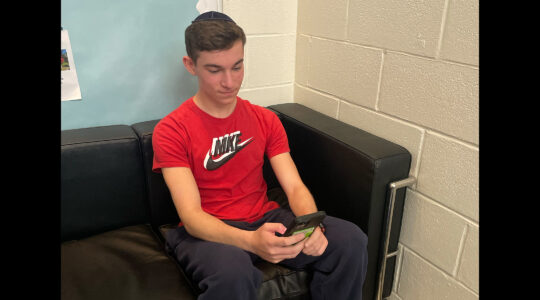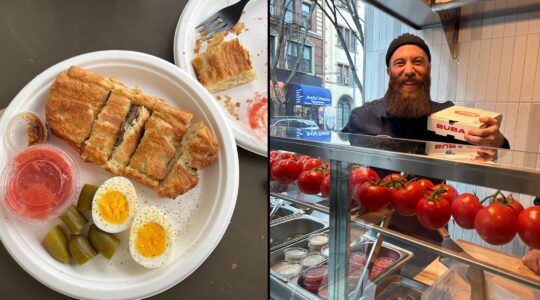MOSCOW (JTA) – Holding a music box up to the microphone, Daniel Kahn asks his audience to stand at attention and spins the crank to play a tinny rendition of “The Internationale,” a socialist workers’ hymn laden with meaning in this post-Soviet capital.
With a heave at the bellows of his marble-red accordion and a stomp of his boot, he then sounds the whistle for the night shift of the International Klezmer Union’s chapter in Moscow.
A two-hour peal of Jewish musical folklore follows, the lyrics spewing from the stage in four languages: English, German, Yiddish and Russian.
“When I’m with the Russians, it’s always a party,” Kahn says.
This was the final sprint of the fourth annual Moscow Yiddish Fest, a weeklong festival of music of the Jewish Diaspora that brought together a global cast of performers to capitalize on a resurgent interest in Jewish music here. They played to packed houses: concert halls during the day, clubs at night.
The festival was founded by Anatoly Pinsky, an educational scholar and adviser to the Russian Ministry of Education. Originally called Dona-Fest, after the Yiddish band Pinsky created, the festival has grown every year. It also has gained the support of the Federation of Jewish Communities, Russia’s largest Jewish umbrella organization, and the Moscow city government.
When Pinsky died in December 2006, his daughters and community members kept the festival going.
With its growing stature, the festival enables musicians from around the world to experience the distinctive Muscovite brand of Yiddish music.
“Many of our musicians were going outside the country to play at other festivals,” said one of Pinsky’s daughters, Zoya Pinskaya. “We wanted to bring them here to see what we have. Now it’s a tradition.”
The festival was comprised of three gala concerts, two in concert halls and one at a Jewish community center. Seminars and academic discussions on Yiddish music also were featured throughout the week. Kahn played two shows in posh Moscow nightclubs with a rotating lineup of festival participants.
At the final concert hall performance, more than 50 musicians packed the stage for a farewell performance conducted by Frank London, a trumpet player from the New York-based Klezmatics.
“When I started showing up here years ago, they would stand up there with a tape recorder and sing in broken Yiddish,” London told JTA. “Now it’s more ingrained into their consciousness.”
As with other facets of Jewish culture, klezmer music suffered under the communist era. London said it took 10 years from the fall of the Soviet Union for an organized klezmer scene to emerge in Moscow. It has been getting closer to its pre-Soviet roots ever since.
Psoy Korolenko, a prolific poet and musician who was involved at the festival’s beginning, said this gathering and others like it provide an opportunity for Klezmer musicians to bond.
“These conventions create intentional communities,” Korolenko said. “Without this the music would stop.”
With his wild, gray-flecked beard and mane to match, Korolenko was Kahn’s right-hand man throughout the weekend, singing backup and loosely translating off-color jokes for Russian-speaking audiences.
On the concert hall stage last Saturday night, Korolenko and Kahn stood out from the staid, Yiddish choral acts and classical clarinet solos as they tried to convince the audience to sing along to a tongue-in-cheek tune about a weeping Russian cosmonaut. The audience wasn’t interested.
But under the low lights of an upscale Moscow nightclub the next night, Kahn’s brand of klezmer found a more receptive crowd. Ebullient Israeli expatriates, Russians and even a Chabad chasid hiding behind sunglasses and a baseball cap sang along with fervor.
The set was at turns bawdy and contemplative, swinging from an up-tempo Russian dance tune to a plodding treatise on Zionism. Kahn’s music and lyrics also reveal an interest in leftist Jewish politics, evident in the group’s most recent homage to a mythical klezmer union – klezmer bund, in German – and the music-box rendition of the socialist anthem.
“I was a bit nervous playing it in” the former Soviet Union, Kahn said, “but everyone there seems to love it.”
Kahn, 29, raised in Detroit and now living in Berlin, is a central player in Germany’s klezmer scene. When he was 18 years old, he bought an accordion from a pawn shop in Ann Arbor, Mich., took it home and learned to play “When the Saints Go Marching In.”
Since then he has led a nomadic life. After graduating from the University of Michigan, where he studied theater, Kahn lived in New Orleans and New York before moving to Berlin. Along the way he has performed in Jewish theater, organized folk festivals and played in lounge acts.
Kahn also found a gateway back to Jewish culture through klezmer, literature and language, he said, gradually exploring his own Jewish identity.
In Berlin, he and his band recorded an album of what he calls “alienation klezmer music” – a combination of radical Yiddish tunes, American gothic music and punk cabaret that draws on his travel experiences. Kahn said that translating lyrics from Yiddish and German to English has become a major interest and source of inspiration for his listless music.
“Home is a tricky thing; home is people for me,” he said. Yiddish “has a sense of alienation. The language is loaded with prejudices and misconceptions. It’s very rich.”
The music scenes in Berlin and Russia are strongly intertwined. Berlin has a vibrant underground music scene built on the foundations of Russian groups, Jewish and secular, who frequently make the trip between Moscow, St. Petersburg and Berlin.
Among them is Naekhovichi, a Jewish group with a shuffling lineup that provided the rhythm section for several performances at the festival. At home with blues riffs and dance beats, the group is comprised of mostly secular players, but they chose to chase their grandfathers’ Jewish roots in Odessa with their music.
Fyodor Mashendzhinov, the drummer for Naekhovichi, said his 4-year-old band plays two types of gigs: synagogues in Russia and club shows in the underground klezmer scene.
Lately, he said, the two worlds have started to merge as Jewish music has become a more stable part of the community.
“It’s very funny to me to see Chasidim and older people in the clubs listening to us,” Mashendzhinov said. “Usually you can only see these people in synagogues, but we are playing this music and it is their cultural background.”
JTA has documented Jewish history in real-time for over a century. Keep our journalism strong by joining us in supporting independent, award-winning reporting.





